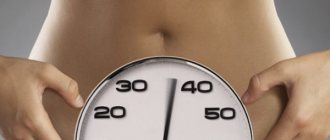When menopause (menopause) occurs, dizziness often makes itself felt. There is no peace with them, and they only cause discomfort. In order to prevent and overcome their attacks, you need to identify the root cause of why they appear.
There are 3 types of dizziness: lightheadedness, vertigo and imbalance. With vertigo, there is a feeling of rotating objects or the body. If balance is disturbed, a person cannot stand for a long time, and in a pre-fainting position, fainting is anticipated.
What is menopause
The menopause is a natural physiological process in the body of every woman. It is characterized by a gradual and irreversible decline in reproductive function, a decrease in the amount of estrogen and progesterone.
Menopause for most women is difficult, pathologies of the heart and blood vessels, and psycho-emotional disturbances develop.
When and how does it start
Normally, menopause begins at the age of 45-50 years. Sometimes changes occur several years earlier or later, which indicates a deviation.
The first sign of changes will be menstrual irregularities, heavy or scanty uterine bleeding. A woman notices a deterioration in the condition of her hair, skin, and nails. The progression of menopause is accompanied by more severe symptoms.
Factors that provoke dizziness during menopause
In adulthood and during menopause, women should avoid situations that increase dizziness. It can be:
- serious stress,
- physical overload,
- head injuries,
- migraine attacks,
- chemical intoxication,
- Unhealthy Lifestyle,
- exposure to direct sunlight, etc.
Symptoms
Women often ask a specialist whether they can feel dizzy during menopause, since the condition causes anxiety for many.
Menopause is almost always accompanied by the following symptoms:
- pain in the lower abdomen, varying in intensity, decreases in the evening;
- sudden change of mood;
- causeless aggression or apathy, indifference, depression;
- loss of appetite;
- weight gain;
- the appearance of a rash on the body;
- chills, slight increase in temperature;
- weakness, fatigue.
The main symptom of menopause is hot flashes, characterized by a sudden sensation of heat in the body, increased activity of the sweat glands, especially at night. The woman feels overwhelmed and depressed.
Manifestation of pathology
During menopause, the disease is usually divided into three stages:
- Vertigo is an unpleasant sensation of rotation of oneself and surrounding objects. In this state, the sizes of objects and distances to them are visually distorted. Weakness appears, vision becomes dark, nausea and vomiting occur. A woman’s reaction to bright light and sharp sounds is inadequate;
- Coordination is impaired and it becomes difficult to control movements. Free movement becomes impossible. It is difficult to maintain balance even in a calm state;
- severe dizziness and nausea appear. Feeling of semi-fainting. At the same time, the heartbeat increases and the limbs begin to tremble. A sharp turn can cause fainting.
Dizziness during menopause also appears for physiological reasons:
- tides. There is a feeling of heat from the rush of blood to the upper body, which activates the sweat glands. Hot flashes are short, but create additional stress on the vascular system;
- increased blood pressure. The volume of estrogen decreases and blood vessels lose elasticity. Deposits appear on their walls. Collagen decreases and cholesterol levels increase. The blood becomes viscous and its normal circulation is disrupted. Deterioration in blood supply manifests itself in dizziness;
- nervousness. A woman during menopause can be more emotional and irritable. Not only the nervous system is under stress, but also the blood vessels, the condition of which affects the vestibular apparatus;
- headache. Vascular spasms cause migraines, which contribute to dizziness. Nausea may often occur;
- insomnia. Menopause deprives many people of normal sleep. The body does not have time to recover. Chronic fatigue develops with various ailments and dizziness.
Vertigo, true dizziness, is most common during menopause. Monitoring the symptoms will help you find out the exact cause.
https://youtu.be/7djg0iyy0ok
What does dizziness mean?
Depending on the degree of manifestation of symptoms, the general condition of the woman and accompanying signs, pathologies that provoke dizziness can be determined.
Provoking factors
A symptom is not an independent disease; it always acts as a consequence of a certain disorder in the body.
Possible causes of dizziness include the following:
- Violation of the vestibular apparatus. Pathology can develop regardless of menopause, but during menopause a woman feels the symptoms acutely. Dizziness develops due to a lack of oxygen in the inner ear.
- Inflammatory diseases of the nerve endings in the inner ear often provoke the appearance of an unpleasant symptom, especially with a sudden change in body position.
- Cervical osteochondrosis provokes pinching of blood vessels and nerve endings. The nutrition of the brain is disrupted, which manifests itself in the form of dizziness.
- Malignant neoplasms provoke similar disorders when the lesion is localized in the brain.
- Cerebral circulation disorders at an early stage.
- Severe arterial hypertension is characterized by severe symptoms, impaired vascular circulation, and the appearance of dizziness.
- Insomnia is considered a common problem, causing dizziness and related symptoms.
- Type 1 diabetes mellitus with a tendency to hypoglycemia.
Hot flashes can provoke headaches and other symptoms that significantly worsen a woman’s condition.
When to see a doctor
In most cases, the pathology does not require therapy or examination and disappears on its own after the condition normalizes.
If your health worsens, complications arise, or chronic diseases worsen, you must contact a specialist to undergo a diagnostic examination. An alarming signal will be loss of consciousness for no apparent reason. This condition requires immediate medical attention.
Causes of dizziness
Dizziness in women during menopause is primarily associated with hormonal disruptions occurring in her body. At this time, the amount of estrogen and other sex hormones in the blood decreases significantly.
The lack of hormones seriously affects the tone of the blood vessels of the brain, so its cells consume less oxygen, which is why attacks of dizziness occur.
In addition, symptoms such as sudden changes in blood pressure and periodic hot flashes begin to appear. All this also contributes to sudden dizziness.
During a hot flash, the volume of blood in the vessels increases significantly, which seriously overloads the circulatory system. The woman begins to feel that various objects are rotating around her and may lose coordination.
Jumps in blood pressure also occur due to the fact that the vessels lose their elasticity, become more permeable, and the functioning of the adrenal glands and endocrine system is no longer so effective.
Constant surges in pressure lead to blockage of blood vessels and the development of cardiac ischemia. As a result, the blood becomes more viscous, and the transport of hemoglobin to the brain becomes more difficult. All this also provokes dizziness.
The autonomic nervous system also does not work at full strength, which manifests itself in a negative emotional and painful mental state. The central nervous system works unstably, causing pathologies of the vestibular apparatus.
Diagnostics
If several signs appear, it is recommended to consult a specialist for a full diagnostic examination and identify the true cause of the disorder. The first step will be an appointment with a therapist. Usually, the doctor will additionally refer you to a gynecologist for an examination using speculum and a laboratory blood test for hormones.
If a pathology of the spinal column is suspected, an examination by a neurologist and an x-ray are necessary. Additionally, a consultation with an endocrinologist or gastroenterologist is prescribed. If there is a significant disturbance in emotional balance, it is recommended to visit a psychotherapist.
Magnetic resonance imaging is indicated in case of signs of cerebral circulation or neoplasms in the brain.
Causes of dizziness during menopause
Dizziness during menopause can bother a woman until the onset of postmenopause: in addition, signs such as anxiety, nervousness, and depression may be present.
Experts believe that the main reason for this condition is an increasing change in hormonal levels, which consists, first of all, in a decrease in the production of hormones by the ovaries.
The pathogenesis of dizziness is simple. An acute lack of estrogen leads to changes in blood vessels:
- to a decrease or increase in the vascular lumen;
- to sudden changes in blood pressure;
- to an increase in the load on the heart, which may manifest itself as tachycardia or cardiac arrhythmia;
- to malfunctions of the autonomic nervous system;
- to thermoregulation disorder.
The above processes secondary lead to a lack of oxygen in some organs and systems of the body. Thus, dizziness, first of all, occurs due to oxygen starvation of the brain.
[5], [6], [7]
Treatment
The treatment regimen largely depends on the underlying cause of the pathology and usually includes medications and alternative medicine recipes. Additionally, you need to make adjustments to your usual lifestyle.
Drugs
Drug therapy is almost always prescribed during menopause in order to normalize hormonal levels and eliminate signs of pathological dizziness.
The most commonly used medications are:
- Selective hormonal drugs, for example, Proginova, Klimara, contain estrogens obtained artificially. Used for severe clinical manifestations of menopause, when the condition affects the functioning of the central nervous and endocrine systems. The dosage is determined by a specialist, taking into account the individual characteristics of the body.
- Herbal remedies with phytoestrogens: Klimadinon, Remens, Qi-klim. Indicated in cases of mild hormonal imbalance, if the woman does not need radical adjustments in estrogen levels. Taken in long courses, they alleviate the general condition, which helps eliminate dizziness and related symptoms.
- Means to normalize the functioning of the vestibular apparatus are prescribed in case of disturbances in nerve conduction or fluid pressure on the inner ear. Vestibo and Vasobral are often used.
- Preparations for normalizing tissue nutrition: Actovegin, Solcoseryl are used for the neurological etiology of dizziness.
- To improve the functioning and microcirculation of the brain, Cerebrolysin, Piracetam and its analogues are used.
- B vitamins, available in tablets and injection solutions, will help normalize nerve conduction. Popular drugs: Neurorubin, Neuromultivit, Milgamma.
- For dizziness caused by hypertension, medications are prescribed to normalize blood pressure: Lisinopril, Enap.
If dizziness is a consequence of a disruption of the endocrine system, the use of drugs containing thyroid hormones, adjustment of insulin doses or hypoglycemic agents is indicated.
Folk remedies
Treatment of the disorder with folk remedies is considered a good alternative to medications for rare and short-term dizziness.
Effective means will be the following:
- Chamomile is a mild sedative of natural origin, normalizes the psycho-emotional state, relieves cerebral vascular spasm, and eliminates all negative signs from the central nervous system. At the pharmacy you can buy bagged chamomile tea or dry raw materials for preparing an infusion. You will need 1 tsp per glass of water. herbs, infusion time - 20 minutes, daily norm - 2 glasses. The duration of use is 14-21 days.
- Peony tincture can be purchased at a pharmacy. The product is suitable for hypertensive patients and patients with nervous tension. It has pronounced sedative and analgesic properties, relieves all manifestations of the central nervous system. You need to take 10-15 drops three times a day for 10 days.
- Oregano helps normalize the emotional state, relieves pain, and relieves cerebral vascular spasm. To prepare tea you will need to pour 3 tbsp. l. dried herb with a liter of boiling water, leave for 30 minutes to infuse, take 100 ml three times a day for 2 weeks.
- Red clover can be purchased at the pharmacy. The herb has unique properties, contains phytoestrogens, improves the condition of women during menopause, and eliminates dizziness. Preparing the infusion is simple: separate 2 tbsp. l. plants, pour a liter of boiling water, leave for 5 hours to infuse. Filter the finished product, take 125 ml twice a day. The duration of the therapeutic course is 2 weeks. Improvement can be felt on the 4th day of use.
- Royal jelly affects the functioning of all body systems. You can buy it at a pharmacy or from professional beekeepers. The dosage should be determined by a specialist, provided there is no allergic reaction to the product.
- Mint can be used for hypertension and disorders of neurological etiology. Tea made from fresh or dried leaves should be drunk at night in the amount of 1 glass. You can prepare the drink from a teaspoon of raw materials and 300 ml of boiling water. The duration of treatment ranges from 10-21 days.
Medicinal plants with a sedative effect should not be combined with sleeping pills and psychotropic drugs.
Lifestyle
Adjusting your lifestyle will help you consolidate the results achieved with the use of medications and folk remedies. In some cases, it becomes the only method to solve the problem.
The first step will be to change your diet, increasing the amount of seafood, vegetables, fruits, nuts, herbs, lean meat, and dairy products in the daily menu. Freshly squeezed juices and eggs in moderate quantities will help compensate for the deficiency of vitamins and minerals.
To normalize water balance, it is recommended to drink at least 2 liters of water per day. It is useful to exclude or minimize the amount of confectionery, spices, spicy, salty, sour foods.
If a woman’s lifestyle is sedentary, it is recommended to correct the situation. Walking in the fresh air, cycling, morning exercises for 10-15 minutes, group exercises in the gym, yoga or shaping - any type of exercise, repeated regularly, will have a beneficial effect on health.
You should give up bad habits such as alcohol or cigarettes for good. After some time, you can notice a significant improvement in your general condition.
Symptoms of dizziness
Menopause is a period of hormonal imbalance in the female reproductive system. The appearance of dizziness (in medical practice called vertigo), accompanied by a feeling of loss of balance, distortion of the shapes and sizes of objects at a distance, and their rotation, is associated with disorders of the vestibular apparatus.
You can suspect vertigo based on the following signs:
- visual disturbances (feeling of a veil before the eyes, the appearance of “stars”, inability to focus on a specific object);
- changes in coordination of movements when changing body position (a sharp rise causes darkening of the eyes);
- noise in ears;
- disturbances in the digestive system (nausea, increased salivation, vomiting) not associated with objective reasons;
- feeling of faintness observed in hypertension;
- a feeling of apathy against a background of general weakness is caused by vegetative-vascular disorders.
Modern medicine offers women to alleviate discomfort with the help of drug therapy, physiotherapy, and traditional medicine methods. A positive effect can only be achieved if the true cause is eliminated.
If your head starts to feel dizzy, you should pay special attention to this. Ignoring this symptom can lead to fainting.
Doctor's recommendations
For regular and prolonged dizziness, experts recommend regularly visiting a doctor, undergoing examinations, and taking a blood test to identify any pathologies at an early stage.
For chronic diseases, the doctor usually prescribes medications for continuous use to prevent exacerbations. The specialist’s main recommendation is a positive attitude.
In a state of depression, a woman cannot perceive the situation normally. The feeling of helplessness and hopelessness certainly provokes even more psychological problems. Any events are perceived negatively, which affects absolutely all processes in the body.
Psychotherapists are confident that during menopause it will be especially important to tune in to a positive mood and not perceive natural changes as the final, joyless stage in life. This is the only way to maintain health and survive menopause painlessly.
Symptoms and signs
How can a woman determine that she is experiencing dizziness during menopause? This will be indicated by the following conditions:
- the illusion of objects moving in space, especially when moving;
- “split” images;
- general weakness and poor health;
- increasing attacks of nausea;
- causeless sweating;
- heat;
- ringing in the ears, problems with hearing and vision.
Sometimes signs of dizziness during menopause are severe headaches, sudden changes in mood, and depression.
Reviews
“During menopause, dizziness bothered me constantly: it disappeared periodically, then reappeared. The doctor said that the reason was high blood pressure, prescribed medicine, and recommended exercising. After 2 weeks of taking pills and doing gymnastics, it became much easier.”
Tamara, 53 years old
“Yoga and herbs saved me from unpleasant symptoms during menopause. I drank chamomile tea every day and worked out whenever possible at home and in the gym. After a month, all symptoms disappeared.”
Valeria, 49 years old
“Remens helped me with dizziness. I took it for a long time, changed my diet, and started walking. The doctor noted improvements, said that the heart began to work stably, the pressure returned to normal.”
Victoria, 50 years old











